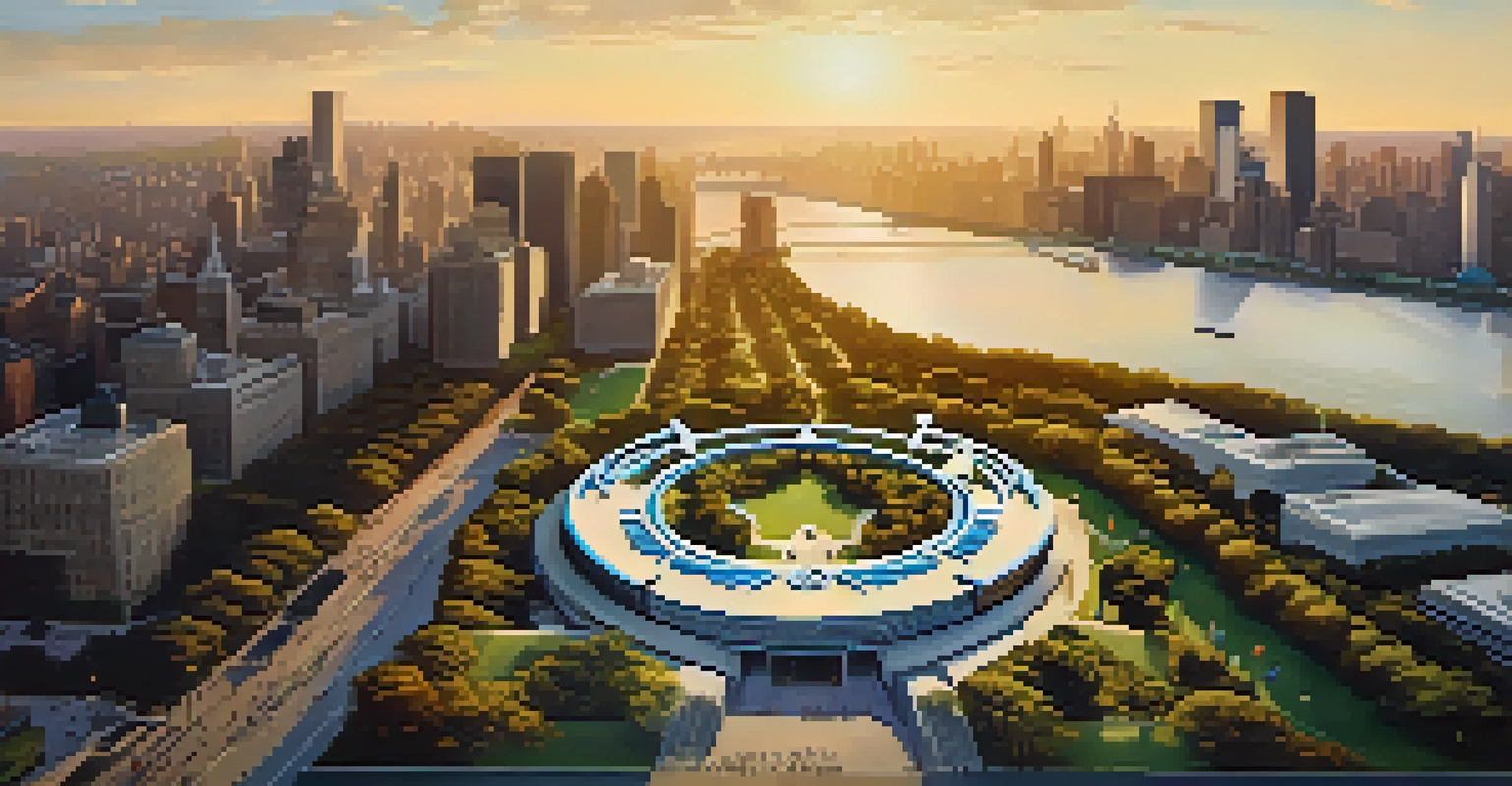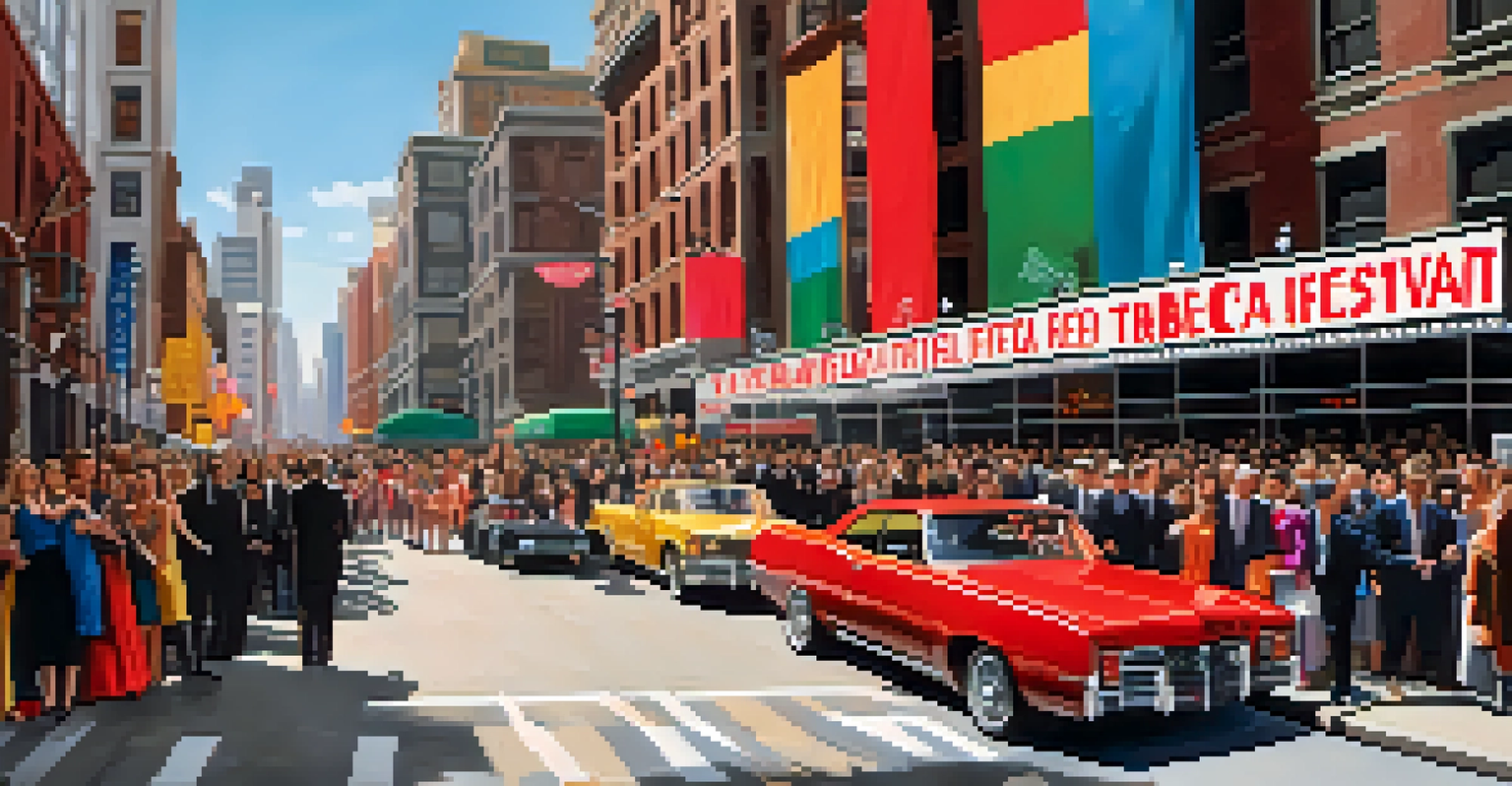New York City: A Historical Perspective on International Relations

The Birth of New York: A Gateway for Immigrants
New York City has long been a melting pot of cultures, a theme that began in its early days. Founded by the Dutch in 1624 as New Amsterdam, the city quickly became a hub for European settlers seeking new opportunities. This influx of immigrants established a diverse population that would lay the groundwork for NYC's role in international relations.
New York is not a city, it's a world.
As immigrants from various backgrounds settled in the city, they brought their languages, traditions, and ideas, creating a vibrant cultural tapestry. This diversity not only enriched the local community but also influenced diplomacy, as these groups began to advocate for their home countries’ interests. Over time, New York City's identity as a global city took shape.
The city's status as a gateway for newcomers continues to impact its political landscape today, shaping policies and fostering international dialogues that reflect its diverse heritage.
The Role of New York in Global Diplomacy
New York City became the epicenter of global diplomacy with the establishment of the United Nations Headquarters in 1945. This move not only symbolized the city's importance on the world stage but also positioned it as a hub for international negotiations and peacekeeping efforts. The UN has facilitated countless discussions aimed at resolving conflicts and promoting cooperation among nations.

With diplomats from nearly every country converging in NYC, the city has become a vibrant marketplace of ideas and a platform for dialogue. Events like the annual UN General Assembly attract global leaders, allowing them to address pressing international issues. This influx of political activity has firmly rooted New York in the fabric of world diplomacy.
NYC: A Cultural Melting Pot
New York City's diverse immigrant population has shaped its identity and role in international relations.
Moreover, the presence of various consulates and international organizations further emphasizes NYC's pivotal role in fostering relationships between countries, making it a key player in shaping international policies.
Cultural Diplomacy: New York's Soft Power
Cultural diplomacy has become an essential tool for nations to build relationships, and New York City is at the forefront of this movement. Through its theaters, museums, and galleries, the city showcases a rich array of cultural offerings that attract global audiences. This cultural exchange fosters understanding and appreciation among diverse communities.
In New York, you can be a nobody, but you can also be a global citizen.
Events like the Tribeca Film Festival and New York Fashion Week not only celebrate local talent but also draw international participants, showcasing the city's role as a cultural nexus. These gatherings serve as a platform for artists and creators from different countries to collaborate and share their stories.
By promoting cultural initiatives, New York enhances its soft power, allowing it to influence global perceptions and establish connections that transcend traditional political or economic ties.
Economic Impact: NYC as a Global Financial Center
New York City's emergence as a global financial center has significantly influenced international relations. Home to Wall Street and major financial institutions, the city drives economic policies and practices that resonate worldwide. This economic prowess attracts businesses and investors, further solidifying NYC's role in the global economy.
The interconnectedness of global markets means that decisions made in New York can have far-reaching effects on economies around the world. Financial crises, trade agreements, and investment trends often originate or are impacted by developments in the city. This dynamic landscape places New York at the heart of economic diplomacy.
Global Diplomacy Hub
The establishment of the United Nations in NYC has positioned the city as a key player in global diplomacy and conflict resolution.
Moreover, NYC's diverse workforce and educational institutions contribute to its economic strength, ensuring that it remains a vital player in shaping international economic policies.
Historical Events that Shaped International Relations
Throughout its history, New York City has played host to numerous significant events that have shaped international relations. For instance, the signing of treaties and peace agreements within its borders has often drawn global attention. These moments not only highlight the city's importance but also demonstrate how local actions can have global ramifications.
Events such as the signing of the Treaty of Paris in 1783, which concluded the American Revolutionary War, underscore NYC's role in establishing new international norms. Additionally, the city's involvement in pivotal global discussions during the Cold War era further solidified its status as a key player in international diplomacy.
These historical milestones serve as reminders that New York City's influence extends far beyond its geographical boundaries, impacting the course of global history.
Challenges and Resilience: NYC's Global Role
New York City has faced numerous challenges that have tested its resilience and ability to navigate international relations. From the September 11 attacks in 2001 to the economic downturns, these events have not only impacted the city but also had global implications. In the face of adversity, NYC has often emerged stronger, reaffirming its position as a global leader.
After 9/11, for example, the city became a symbol of resilience, showcasing the strength of communities coming together. This solidarity resonated worldwide, leading to renewed international cooperation in security and counter-terrorism efforts. NYC's ability to rebound from such crises has reinforced the importance of maintaining open dialogues with other nations.
Economic Powerhouse Impact
As a global financial center, New York City's economic decisions resonate worldwide, influencing international policies.
Through these challenges, New York City has demonstrated that its role in international relations is not just about power and influence but also about fostering connections and collaboration in times of need.
The Future of New York City in International Relations
Looking ahead, New York City's role in international relations will continue to evolve in response to global challenges. Issues such as climate change, public health, and technological advancements require collaborative solutions that transcend borders. As a global city, NYC is well-positioned to lead these conversations, fostering partnerships that address pressing issues.
Emerging technologies and shifts in economic power will also influence the city's international engagement. NYC's commitment to innovation and adaptability will be crucial in maintaining its relevance on the world stage. By embracing change and fostering an inclusive environment, the city can continue to attract diverse voices and ideas.

Ultimately, the future of New York City's international relations will depend on its ability to navigate complexities while remaining a welcoming space for dialogue, collaboration, and progress.